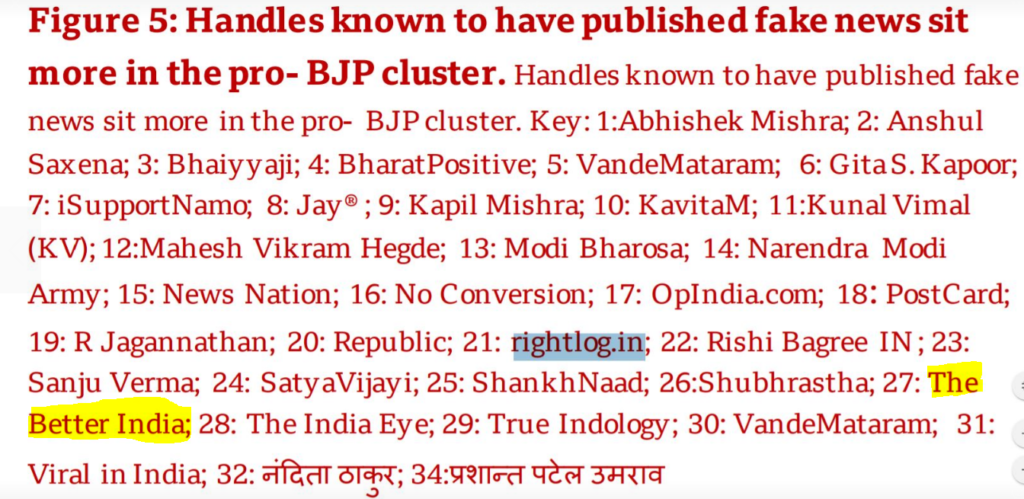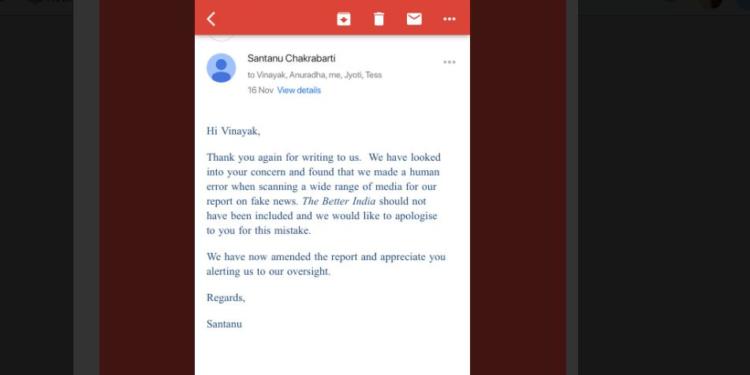The British Broadcasting Corporation (BBC) in its recent bogus report on fake news, accused many reputed news media websites and famous personalities of spreading fake news. The Better India, a media portal which is known for featuring positive news about India, is one such website which was accused of spreading fake news by the BBC.
 The Better India took serious offence to this and wrote to the BBC. In its response said, “We have looked into your concern and found that we made a human error when scanning a wide range of media for our report on fake news. The Better India should not have been included and we would like to apologize to you for this mistake.”
The Better India took serious offence to this and wrote to the BBC. In its response said, “We have looked into your concern and found that we made a human error when scanning a wide range of media for our report on fake news. The Better India should not have been included and we would like to apologize to you for this mistake.”
However, The Better India has demanded a public apology from the BBC for maligning its image in public.
In its recent report on fake news, @BBC @BBCIndia falsely accused us of spreading fake news. We wrote to them and here is their response, confirming their mistake citing ‘human error’. We expect a public apology from them for maligning years of our hard work. Please RT. pic.twitter.com/1XNalsXtkw
— The Better India (@thebetterindia) November 17, 2018
The Better India raised a good point, since the BBC has tarnished its image in public so the apology should also be in public and not in private.
Thanks for the support! But we don’t think it has been sorted yet. They maligned us in public but the apology was in private. We demand a public apology from them.
— The Better India (@thebetterindia) November 17, 2018
The Better India is the only website which never gives any negative news, so spreading fake news is impossible to imagine.
The BBC’s so-called ‘human error’ further raises a serious question mark on the credibility of BBC’s report on fake news. Its report is already a subject of fun among sane minded Indians because of issues regarding methodology and data collection. The report was based on the survey analyzing three countries, interviewing 80 odd people in these countries, and out of these 80 people, 40 were from India.
Just to put things into perspective, India has a population of 1.3 billion people. There are over 30 million Twitter users, around 300 million FB users, and BBC’s sample size was just 40 people. Clearly, it is a statistically inadequate sample. Even, college students use a bigger sample size and make logical and sensible claims. The sheer basics of research methodology have been ignored.
Secondly, the BBC had invited social media trolls like Divya Spandana and Ankit Lal in their gathering who frequently peddle questionable information and are abusive on social media.
The choice of handles which have been labeled by the BBC is purveyor of fake news or those who mostly spread fake news are also biased. The BBC report looks like a deliberate attempt to intentionally save the actual alleged news websites, media portals, FB pages and twitter handles whose only work is to spread the fake news and hatred.
Thomas Sowell in his work ‘The Vision of the Anointed’ has said, “The media are less a window on reality, than a stage on which officials and journalists perform self-scripted, self-serving fictions.” This aptly defines BBC and its bogus report on fake news.
























